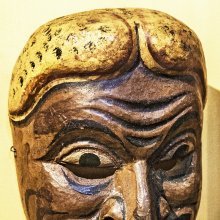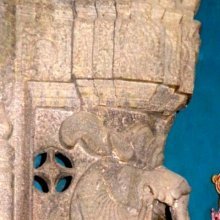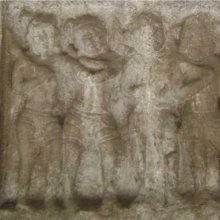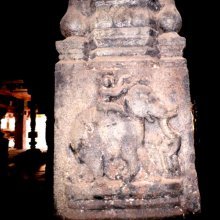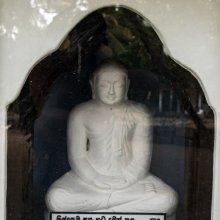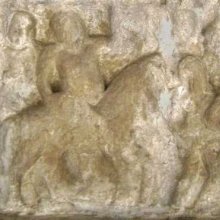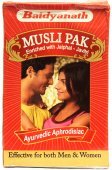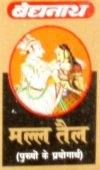Man, Mān, Maṇ, Maṉ, Māṉ, Mēṉ: 23 definitions
Introduction:
Man means something in Buddhism, Pali, Hinduism, Sanskrit, the history of ancient India, Marathi, Hindi, biology, Tamil. If you want to know the exact meaning, history, etymology or English translation of this term then check out the descriptions on this page. Add your comment or reference to a book if you want to contribute to this summary article.
Images (photo gallery)
(+84 more images available)
In Hinduism
Vyakarana (Sanskrit grammar)
Source: Wikisource: A dictionary of Sanskrit grammarMaṇ (मण्).—tad. affix म (ma), causing vṛddhi for the word मध्य (madhya), in the sense of 'present therein' (तत्र भवः (tatra bhavaḥ)); e.g. माध्यमः (mādhyamaḥ); cf. मण्मीयौ चापि प्रत्ययौ (maṇmīyau cāpi pratyayau), P.IV. 3.60 Vārt. 2.
--- OR ---
1) Man (मन्).—The affix मनिन् (manin) generally found in Vedic Literature added to roots ending in आ (ā) and preceded by a noun; e.g. सुदामा, अश्वत्थामा (sudāmā, aśvatthāmā); cf. आतो मनिन्कनिब्वनिपश्च (āto maninkanibvanipaśca) P.III.2.74,75;
2) Man.—Uṇādi affix in ओद्म (odma); cf. औद्म इति उन्देरौणादिके मन्प्रत्यये नलोपो गुणश्च निपात्यते (audma iti underauṇādike manpratyaye nalopo guṇaśca nipātyate) Kāś. on P. VI.4.29.

Vyakarana (व्याकरण, vyākaraṇa) refers to Sanskrit grammar and represents one of the six additional sciences (vedanga) to be studied along with the Vedas. Vyakarana concerns itself with the rules of Sanskrit grammar and linguistic analysis in order to establish the correct context of words and sentences.
Shilpashastra (iconography)
Source: Shodhganga: The significance of the mūla-beras (śilpa)Mān (“deer”) refers to a type of animal form, representing one of the several “attributes” (āyudha) or “accessories” of a detiy commonly seen depicted in Hindu iconography, defined according to texts dealing with śilpa (arts and crafs), known as śilpaśāstras.—The śilpa texts have classified the various accessories under the broad heading of āyudha or karuvi (implement), including even flowers, animals, and musical instruments. The animals and birds found as vehicles for the deities or held as attributes or weapons in the hands of the deities are, for example, Mān.
Source: Shodhganga: Elements of Art and Architecture in the Trtiyakhanda of the Visnudharmottarapurana (shilpa)Men are classified into five kinds which are defined according to the principles of ancient Indian Painting (citra), according to the Viṣṇudharmottarapurāṇa, an ancient Sanskrit text which (being encyclopedic in nature) deals with a variety of cultural topics such as arts, architecture, music, grammar and astronomy.—In the third part of the Viṣṇudharmottarapurāṇa, nine chapters i.e., chapters from 35th to 43rd are dedicated to Painting where portraits of different kinds of men and women. A specific measurement of every limb of a man as well as of a woman is elaborately and systematically discussed.
According to this book, there are five types of men viz.,
- haṃsa,
- bhadra,
- mālavya,
- rucaka and
- śaśaka.
According to the Viṣṇudharmottarapurāṇa there are five types of women and the divisions of women follow the varieties of men.

Shilpashastra (शिल्पशास्त्र, śilpaśāstra) represents the ancient Indian science (shastra) of creative arts (shilpa) such as sculpture, iconography and painting. Closely related to Vastushastra (architecture), they often share the same literature.
Natyashastra (theatrics and dramaturgy)
Source: Shodhganga: Elements of Art and Architecture in the Trtiyakhanda of the Visnudharmottarapurana (natya)Man (opposite of Woman) is denoted by the Sanskrit term Nara, whereas Narasiṃhāvatāra refers to one of the Daśāvatāra (“ten incarnations”) (of Lord Viṣṇu) to which are assign various hand gestures (in Indian Dramas), according to the Viṣṇudharmottarapurāṇa, an ancient Sanskrit text which (being encyclopedic in nature) deals with a variety of cultural topics such as arts, architecture, music, grammar and astronomy.—The term Narasiṃha is the union of two Sanskrit words viz., nara and siṃha. Nara means man and Siṃha means lion. So, this incarnation of lord Viṣṇu shows his form of half man and half lion. It is the most furious incarnation of lord Viṣṇu.

Natyashastra (नाट्यशास्त्र, nāṭyaśāstra) refers to both the ancient Indian tradition (shastra) of performing arts, (natya—theatrics, drama, dance, music), as well as the name of a Sanskrit work dealing with these subjects. It also teaches the rules for composing Dramatic plays (nataka), construction and performance of Theater, and Poetic works (kavya).
In Buddhism
Tibetan Buddhism (Vajrayana or tantric Buddhism)
Source: ORA: Amanaska (king of all yogas): (Tibetan Buddhism)Men (in Sanskrit: Puruṣa) can be controlled by one having the Siddhi (power) of Speech, according to verse 14.24bd-27 of the Laghuśaṃvara, an ancient Buddhist Yoginī Tantra.—Accordingly: “The Sādhaka [who has] the Siddhi of speech can certainly attract a king or queen by [merely] thinking [it]. [...] And he can stop a river, a cart, a machine [like a water-wheel,] the ocean, elephants and horses, clouds, a man (puruṣa) or bird merely by means of his speech. He achieves everything which he desires by his speech”.

Tibetan Buddhism includes schools such as Nyingma, Kadampa, Kagyu and Gelug. Their primary canon of literature is divided in two broad categories: The Kangyur, which consists of Buddha’s words, and the Tengyur, which includes commentaries from various sources. Esotericism and tantra techniques (vajrayāna) are collected indepently.
India history and geography
Source: Cologne Digital Sanskrit Dictionaries: Indian Epigraphical GlossaryMan.—cf. mānayitvā (LP) ‘having accepted’; cf. Gujarātī mānine. Note: man is defined in the “Indian epigraphical glossary” as it can be found on ancient inscriptions commonly written in Sanskrit, Prakrit or Dravidian languages.

The history of India traces the identification of countries, villages, towns and other regions of India, as well as mythology, zoology, royal dynasties, rulers, tribes, local festivities and traditions and regional languages. Ancient India enjoyed religious freedom and encourages the path of Dharma, a concept common to Buddhism, Hinduism, and Jainism.
Biology (plants and animals)
Source: Google Books: CRC World Dictionary (Regional names)1) Men in India is the name of a plant defined with Casearia tomentosa in various botanical sources. This page contains potential references in Ayurveda, modern medicine, and other folk traditions or local practices It has the synonym Anavinga lanceolata Lam. (among others).
2) Men in Thailand is also identified with Clausena harmandiana It has the synonym Glycosmis harmandiana Pierre (etc.).
Example references for further research on medicinal uses or toxicity (see latin names for full list):
· Flora Indica (1832)
· Journal of Natural Products
· Hortus Bengalensis, or ‘a Catalogue of the Plants Growing in the Hounourable East India Company's Botanical Garden at Calcutta’ (1814)
· Planta Medica (2000)
· Familles des Plantes (1763)
· Encyclopédie Méthodique, Botanique (Lamarck) (1783)
If you are looking for specific details regarding Men, for example extract dosage, chemical composition, side effects, health benefits, pregnancy safety, diet and recipes, have a look at these references.

This sections includes definitions from the five kingdoms of living things: Animals, Plants, Fungi, Protists and Monera. It will include both the official binomial nomenclature (scientific names usually in Latin) as well as regional spellings and variants.
Languages of India and abroad
Marathi-English dictionary
Source: DDSA: The Molesworth Marathi and English Dictionarymān (मान्).—(m f n) A Sanskrit affix to nouns ending otherwise than in a or ā, or in a consonant of which the inherent short vowel is dropped; forming them into attributives. Ex. buddhimān, śaktimān. This affix therefore supplies the deficient power of the affix vān q. v. Note. This affix, although its forms in gender are given above, is, in Maraṭhi, seldom declined.
Source: DDSA: The Aryabhusan school dictionary, Marathi-Englishmān (मान्).—m A Sanskrit affix to nouns showing possession, as śaktimān, buddhimān.
Marathi is an Indo-European language having over 70 million native speakers people in (predominantly) Maharashtra India. Marathi, like many other Indo-Aryan languages, evolved from early forms of Prakrit, which itself is a subset of Sanskrit, one of the most ancient languages of the world.
Sanskrit dictionary
Source: DDSA: The practical Sanskrit-English dictionaryMaṇ (मण्).—1 P. (maṇati) To sound, murmur.
--- OR ---
Man (मन्).—I. 1 P. (manati)
1) To be proud.
2) To worship. -II. 1 Ā. (mānayate)
1) To be proud.
2) To stop, to obstruct; L. D. B. -III. 4, 8 Ā. (manyate, manute, mene, amaṃsta, maṃsyate, mantum, mata)
1) To think, believe, suppose, imagine, fancy, conceive; अङ्कं केऽपि शशङ्किरे जलनिधेः पङ्कं परे मेनिरे (aṅkaṃ ke'pi śaśaṅkire jalanidheḥ paṅkaṃ pare menire) Subhāṣ; वत्स मन्ये कुमारेणानेन जृम्भकास्त्रमामन्त्रितम् (vatsa manye kumāreṇānena jṛmbhakāstramāmantritam) Uttararāmacarita 5; कथं भवान् मन्यते (kathaṃ bhavān manyate) 'what is your opinion' ?
2) To consider, regard, deem, look upon, take (one) for, take to be; समीभूता दृष्टिस्त्रिभुवनमपि ब्रह्म मनुते (samībhūtā dṛṣṭistribhuvanamapi brahma manute) Bhartṛhari 3.84; अमंस्त चानेन परार्ध्यजन्मना स्थितेरभेत्ता स्थितिमन्तमन्वयम् (amaṃsta cānena parārdhyajanmanā sthiterabhettā sthitimantamanvayam) R.3.27; 1.32;6.84; नित्यं वा मन्यसे मृतम् (nityaṃ vā manyase mṛtam) Bhagavadgītā (Bombay) 2.26,35; Bhaṭṭikāvya 9.117; स्तनविनिहितमपि हारमुदारम् । सा मनुते कृशतनुरिव भारम् (stanavinihitamapi hāramudāram | sā manute kṛśatanuriva bhāram) Gītagovinda 4.
3) To honour, respect, value, esteem, think highly of, prize; यस्यानुषङ्गिण इमे भुवनाधिपत्यभोगादयः कृपणलोकमता भवन्ति (yasyānuṣaṅgiṇa ime bhuvanādhipatyabhogādayaḥ kṛpaṇalokamatā bhavanti) Bhartṛhari 3.76.
4) To know, understand, perceive, observe, have regard to; मत्वा देवं धनपतिसखं यत्र साक्षाद्वसन्तम् (matvā devaṃ dhanapatisakhaṃ yatra sākṣādvasantam) Meghadūta 75.
5) To agree or consent to, act up to; तन्मन्यस्व मम वचनम् (tanmanyasva mama vacanam) Mṛcchakaṭika 8.
6) To think or reflect upon.
7) To intend, wish or hope for; स्त्रियः कस्माद्वधं वीर मन्यसे राक्षसेश्वर (striyaḥ kasmādvadhaṃ vīra manyase rākṣaseśvara) Rām.6.92. 6.
8) To set the heart or mind on.
9) To mention, declare.
1) To think out, device, invent.
11) To be considered or regarded as, seem, appear like.
12) To accept, agree; कालपाशमहं मन्ये त्वमपि द्रष्टुमर्हसि (kālapāśamahaṃ manye tvamapi draṣṭumarhasi) Mahābhārata (Bombay) 17.1.3. (The senses of man are variously modified according to the word with which it is used; e. g. bahu man to think highly or much of, value greatly, prize, esteem; bahu manute nanu te tanusaṃgatapavanacalitamapi reṇum Gītagovinda 5; see under bahu also; laghu man to think lightly of, despise, slight; prathamopakṛtaṃ marutvataḥ pratipattyā laghu manyate bhavān Ś.7.1; anyathā man to think otherwise; doubt; sādhu man to think well of, approve, consider satisfactory; ā paritoṣādviduṣāṃ na sādhu manye prayogavijñānam Ś.1.2; asādhu man to disapprove; tṛṇāya man or tṛṇavat man to value at a straw, value lightly, make light of; harimapyamaṃsata tṛṇāya Śi;15.61; na man to disregard, not to mind.) -Caus. (mānayati-te) To honour, esteem, respect, pay respect to, value; मान्यान् मानय (mānyān mānaya) Bhartṛhari 2.77; (Ātm.) to esteem one-self highly, prize highly. -Desid. (mīmāṃsate)
1) To reflect upon, examine, investigate, inquire into.
2) To doubt, call in question (with loc).
--- OR ---
Mān (मान्).—I. 1 Ā. (mīmāṃsate = desid. of man q. v.) -II. I P., 1 U. = Caus. of मन् (man) q. v.
Source: Cologne Digital Sanskrit Dictionaries: Shabda-Sagara Sanskrit-English DictionaryMaṇ (मण्).—[maṇa] r. 1st cl. (maṇati) To sound, to sound inarticulately.
--- OR ---
Man (मन्).—r. 4th cl. (manyate) (u) manu r. 8th cl. (manute) 1. To know, to understand. 2. To regard, to mind. 3. To think, to conceive. r. 10th cl. (mānayate) 1. To be dull or insensible. 2. To be proud. 3. To oppose, to stop. r. 1st and 10th cls. (manati mānayati) To hononr, to respect, to worship. With anu prefixed, To assent to, to agree. With abhi. To desire. With ava, To disrespect. With sama To concur, to agree.
--- OR ---
Mān (मान्).—r. 1st cl. (mīmāṃsate) To investigate, to seek or desire knowledge. r. 1st and 10th cls. (mānati mānayati-te) To respect, to revere, to worship. With apa or ava prefixed, to treat with disrespect.
Source: Cologne Digital Sanskrit Dictionaries: Benfey Sanskrit-English DictionaryMaṇ (मण्).—i. 1, [Parasmaipada.] To sound, to murmur. Ptcple. of the pf. pass. maṇita, [Nalodya, (ed. Benary.)] 2, 60. n. A murmuring sound.
--- OR ---
Man (मन्).—i. 4, and ii. 8, [Ātmanepada.] (in epic poetry, and also elsewhere [Parasmaipada.], e. g. [Pañcatantra] ii. [distich] 97). 1. To think,
— With the prep. anu anu, 1. To assent, [Mānavadharmaśāstra] 9, 97. 2. To approve, [Rāmāyaṇa] 2, 2, 13. 3. With na, To disown, [Raghuvaṃśa, (ed. Stenzler.)] 16, 85. 4. To permit, [Rāmāyaṇa] 2, 21, 45. 5. To pardon, [Śākuntala, (ed. Böhtlingk.)] [distich] 116. anumata, 1. Assented to, [Mānavadharmaśāstra] 3, 4. 2. Concurred with. 3. Accepted, [Daśakumāracarita] in
— With abhi abhi, 1. To intend, [Pañcatantra] 15, 23. 2. To desire, [Mānavadharmaśāstra] 10, 95. 3. To approve, Mahābhārata 2, 1374. 4. To believe, [Bhaṭṭikāvya, (ed. Calc.)] 5, 71. 5. To consider, [Pañcatantra] iii. [distich] 154. 6. To surpass, Mahābhārata 3, 1388. abhimata, 1. Wished. 2. Assented to. 3. Agreeable, [Meghadūta, (ed. Gildemeister.)] 50. 4. Beloved, [Pañcatantra] i. [distich] 80. n. Wish, [Hitopadeśa] 57, 5, M. M. Comp. An -abhimata-, adj. disagreeable, [Hitopadeśa] 15, 2, M. M. Yathā-abhimata + m, adv. according to one’s wish; how one lists, ad libitum, [Pañcatantra] 167, 24.
— With ava ava, To despise, [Mānavadharmaśāstra] 4, 135; [Vikramorvaśī, (ed. Bollensen.)] [distich] 30. 2. To offend, [Mānavadharmaśāstra] 8, 84. [Causal.] To despise, [Mānavadharmaśāstra] 2, 50.
— With abhyava abhi-ava, To disdain, [Mānavadharmaśāstra] 4, 249.
— With prati prati, [Causal.] To honour, [Rāmāyaṇa] 3, 53, 27.
— With vi vi, vimata, 1. Disliking. 2. Disagreeing. m. An enemy (rather mata with vi). [Causal.] To disgrace, [Śākuntala, (ed. Böhtlingk.)] [distich] 116. vimānita, Dishonoured, [Pañcatantra] i. [distich] 127.
— With sam sam, 1. To think, [Rāmāyaṇa] 3, 52, 2. 2. To resolve, [Rāmāyaṇa] 3, 53, 4. saṃmata; 1. Assented to, approved; aśvapṛṣṭhe saṃmata, A good horseman, [Rāmāyaṇa] 1, 19, 19. 2. Conformable. 3. Like, resembling,
— Cf. mnā, mali; (= mata), (not real, only imagined), [Latin] monere, monstrum, monstrare, mentiri (cf. mati), mendax; [Gothic.] munan, muns, munths (cf. mantra); A. S. manian, monian, ge-munan, mudh.
--- OR ---
Mān (मान्).—i. 10 (properly [Causal.] of man, q. cf.), and † i. 1, [Parasmaipada.] To honour.
Source: Cologne Digital Sanskrit Dictionaries: Cappeller Sanskrit-English DictionaryMan (मन्).—manyate manyati manute [participle] mata (q.v.) think, believe, imagine; consider as or take for (2 [accusative], [accusative] & [dative], or [accusative] & [adverb] in vat), also refl. consider one’s self as, pass for, appear as ([nominative] ±iva); think fit or right, approve of ([accusative]); think of, meditate on (as in prayer), intend or wish for, remember, mention, declare ([accusative], [rarely] [genetive]); find out, invent; perceive, observe, know, understand, comprehend ([genetive] or [accusative]). With bahu esteem, honour, [with] laghu disesteem, despise, [with] sādhu (±iti) approve, commend, [with] tṛṇāya (cf. above) value at a straw, esteem lightly, [with] na think nothing of, disregard; manye methinks-(often inserted parenthetically). [Causative] mānayati (te), [participle] mānita honour, esteem. [Desiderative] mīmāṃsate (ti) consider, examine, call in question.
Source: Cologne Digital Sanskrit Dictionaries: Monier-Williams Sanskrit-English Dictionary1) Maṇ (मण्):—[class] 1. [Parasmaipada] maṇati, to sound, murmur, [Dhātupāṭha xiii, 5.]
2) Man (मन्):—[from mad] a in [compound] for 1. mad.
3) b [class] 8. 4. [Ātmanepada] ([Dhātupāṭha xxx, 9; xxv, 67]) manute, manyate ([Epic] also ti; 3. [plural] manvate, [Ṛg-veda]; [perfect tense] mene, [Brāhmaṇa] etc.; mamnāthe, nāts, [Ṛg-veda]; [Aorist] amata, amanmahi [subjunctive] manāmahe, mananta, p. manāna q.v., [Ṛg-veda]; maṃsi, amaṃsta [subjunctive] maṃsate Prec. maṃsīṣṭa, 1. [person] mc. masīya, [ib.]; māṃsta, [Atharva-veda], stādm, [Taittirīya-āraṇyaka]; mandhvam, [Brāhmaṇa]; amaniṣṭa [grammar]; [future] maṃsyate, [Brāhmaṇa], ti, [Mahābhārata]; manta, manitā [grammar]; maniṣyate, [Ṛg-veda]; [infinitive mood] mantum, [Mahābhārata] etc., mantave, tavai, [Ṛg-veda], mantos, [Brāhmaṇa]; [indeclinable participle] matvā, [Upaniṣad] etc.; manitvā [grammar]; -matya, [Brāhmaṇa] etc.; -manya, [Mahābhārata] etc.),
—to think, believe, imagine, suppose, conjecture, [Ṛg-veda] etc. etc. (manye, I think, methinks, is in later language often inserted in a sentence without affecting the construction; cf. [gana] cādi and, [Pāṇini 4-1, 106]);
—to regard or consider any one or anything ([accusative]) as ([accusative] with or without iva, or [adverb], often in -vat; in later language also [dative case], to express contempt cf. [Pāṇini 2-3, 17], e.g. [gana] rājyaṃ tṛṇāya manye, ‘I value empire at a straw’ id est. I make light of it = laghu √man, and opp. to bahu, or sādhu √man, to think much or well of, praise, approve), [ib.];
—to think one’s self or be thought to be, appear as, pass for ([nominative case]; also with iva), [ib.];
—to be of opinion, think fit or right, [Mahābhārata; Kāvya literature] etc.;
—to agree or be of the same opinion with ([accusative]), [Mahābhārata];
—to set the heart or mind on, honour, esteem (with na, disdain), hope or wish for ([accusative] or [genitive case]), [Ṛg-veda] etc. etc.;
—to think of (in prayer etc., either ‘to remember, meditate on’, or ‘mention, declare’, or ‘excogitate, invent’), [Ṛg-veda; Atharva-veda];
—to perceive, observe, learn, know, understand, comprehend ([accusative], [Vedic or Veda] also [genitive case]), [Ṛg-veda] etc. etc.;
—to offer, present, [Mahābhārata] :—[Causal] ([Dhātupāṭha xxxiv, 36]) mānayati ([Epic] also te; [Aorist] amīmanat; [Passive voice] mānyate),
—to honour, esteem, value highly (also with uru, bahu and sādhu), [Atharva-veda] etc. etc.;—([Ātmanepada]) stambhe, [Dhātupāṭha xxxiii, 35];—garvake, [ib.; Vopadeva] :—[Desiderative] ([Dhātupāṭha xxiii, 3]) mīmāṃsate (rarely ti; amīmāṃsiṣṭhās, [Śatapatha-brāhmaṇa]; mīmāṃsyate, [Atharva-veda]; mimaṃsate, mimaniṣate [grammar]),
—to reflect upon, consider, examine, investigate, [Atharva-veda; Brāhmaṇa] etc.;
—to call in question, doubt (‘with regard to’ [locative case]), [ib.] :—[Desiderative] of [Desiderative] mimāmiṣate [grammar]:—[Intensive] manmanyate, manmanti[ib.]
4) cf. [Zend] man; [Greek] μένω, μέμονα, [Latin] meminisse, monere; [Slavonic or Slavonian] and [Lithuanian] minéti; [Gothic] ga-munan; [German] meinen; [English] mean.
5) Mān (मान्):—[class] 1. 10. [Parasmaipada] mānati, mānayati, to honour, respect, [Dhātupāṭha xxxiv, 36] (cf. √man, of which mānayati is the [Causal])
Source: Cologne Digital Sanskrit Dictionaries: Yates Sanskrit-English Dictionary1) Maṇ (मण्):—maṇati 1. a. To sound.
2) Man (मन्):—(ya, ṅa) manyate 4. d. To know; to think; to regard. (da, ṅa, u) manute 8. d. Idem. (ka, ṅa) mānayate 10. d. To be dull, proud, oppose. (ki, ña) manati, mānayati 1. 10. c. To honor, worship; with anu to conjecture, agree; with abhi to be proud, desire; with ava to disrespect; with saṃ to honor, concur.
3) Mān (मान्):—mīmāṃsite 1. d. To investigate (ki) mānati mānayati to 10. a. To respect, to worship. With apa or ava to disrespect, disgrace.
Source: DDSA: Paia-sadda-mahannavo; a comprehensive Prakrit Hindi dictionary (S)Man (मन्) in the Sanskrit language is related to the Prakrit word: Maṇa.
[Sanskrit to German]
Sanskrit, also spelled संस्कृतम् (saṃskṛtam), is an ancient language of India commonly seen as the grandmother of the Indo-European language family (even English!). Closely allied with Prakrit and Pali, Sanskrit is more exhaustive in both grammar and terms and has the most extensive collection of literature in the world, greatly surpassing its sister-languages Greek and Latin.
Hindi dictionary
Source: DDSA: A practical Hindi-English dictionary1) Man in Hindi refers in English to:—(nm) mind; heart; desire, wish; disposition; maund-a weight equal to forty seers; ~[kamana] see [manokamana] fabricated; concocted; imaginary/imagined; ~[cala] Don Quixote, fidgety; frivolous, easy prey to female brandishments; ~[caha/cita] favourite, desired, wished or longed for; ever desired; ~[pasamda] after one’s own heart, favourite, to one’s liking; •[cija] one’s cup of tea; ~[bahalava] amusement, entertainment, recreation; ~[bhaya] favourite, pleasing; loved; ~[bhavana] favourite, liked, beloved; charming, attractive; ~[mana] arbitrary; licentious; self-willed; ~[mani] feminine form of ~[mana]; •[ghara jani] arbitrary conduct with no restraint; ~[mutava] bad blood, ill feeling, estrangement; rift; antagonism; ~[modaka] castles in the air, day-dreaming, illusory delight; •[phodana] to build castles in the air, to day-dream; ~[mohana] one who casts a spell of charm; an epithet of Lord Krishna; ~[mauji] whimsical, self-willed; capricious; hence •[pana] (nm); ~[hara/harana] see [manohara; -atakana/ana, kisi para] to take a fancy for, to fall for;- [adha hona] to be disheartened/discouraged; —[uchalana] to be exalted;—[udana] to be unsteady, to be in a state of lack of concentration; —[ulajhana, kisi se] to fall for, to have an infatuation for, to be attracted towards; —[kacca karana] to lose courage, to be worried; to discourage; —[kada karana] to harden one’s heart, to keep up one’s nerves; —[ka ujala jibha ka kaduva] his bark is worse than his bite; —[ka kacca] weak-minded; —[ka kala/maila] vicious; evil-hearted; —[ka maila dhona] to circumcise the heart; —[ki amkhem] mind’s eye, inner vision; —[ki gamtha] reservations. complex; —[ki thaha lena] to probe into the depth of somebody’s heart; —[ki bata mana mem rahana] one’s wish not to be fulfilled; —[ke laddu khana/phodana] to build castles in the air; to be delighted by mere imagination; to day-dream; —[khatta hona] to develop a sense of bitterness, to be estranged; —[khimcana] to feel a sense of repulsion; (-, [kisi ki ora]) to be attracted; —[kholana] to reveal oneself; —[calana] to be captivated / attracted; to wish/desire; —[chuna] to touch, to move; —[chota karana] to feel disheartened / dejected; —[jamana] to feel reassured/convinced; —[jitana] to win over one’s heart; —[tatolana] to probe into one’s heart; to throw a feeler; —[tutana] to lose courage; to be disheartened; to be distracted; —[thaharana] to feel steady; —[thukana] to feel assured; —[damvadola hona/digana] to be swept off; to be unsteady; —[dolana] to be moved; to be attracted; to lose self-restraint; —[dena] to disclose one’s secrets; to do something with full heart; —[nacana] to be in exaltation, to be in a state of extreme delight; —[padhana] to read somebody’s feelings; —[pana] to get the backing of; to know the mind of; —[phatana/phira jana] to be disillusioned; to be estranged; —[badhana] to gain confidence, to be heartened; —[bahalana] to amuse, to recreate; —[budha hona] to become mentally old, to lose youthful feelings; —[bharana] to be fed up, to be satiated/satisfied; —[bhari hona] to have a heavy heart; —[mana bhavai mumdi halavai] "No, thank you", has lost many a good butter cake; —[masosa kara raha jana] to keep one’s feelings under suppression, to be agonisingly helpless; —[marana] to suppress one’s feelings; —[mare] ([hue]) dejected; in pensive mood; sadly; —[milana] to be of one /similar taste, inclination or ideas; to feel one with; to love each other; —[mem ana] to occur in one’s mind; —[mem kahana] to speak within; —[mem gamtha padana] to develop a complex/reservation for; —[mem ghara karana/jagaha karana/basana] to make a place in one’s heart, to become somebody’s beloved; —[mem baithana] to strike deep root in the heart, to become permanently embedded in; —[mem maila ana] ill-will to be aroused within; a sense of dishonesty to prevail within; —[mem rakhana] always to remember, to keep in view, to keep concealed to oneself; not to divulge; —[maila karana] to feel dejected, to be disheartened; —[maila hona] to be in the grip of evil; to have a sense of estrangement; —[rakhana] to comply with someone’s wish; to do as one wishes (so as not to let him/her feel bad); —[ramana] to feel engrossed/absorbed; to identify with; —[lagana] to feel at home; to feel easy; to like; to be one with; —[lena] to probe into one’s heart, to find one’s inner feeling; —[sapha hona] to be clear, to have no grudge against, to have no reservations; —[se utarana] to be liked no more, to lose appeal; —[hatana] to be distracted, to be repelled; —[hara hona] to feel happy; to be delighted; —[halka hona] to feel relieved, to feel easy, to feel better; —[hatha mem hona] to have self-control, to have control over one’s feelings; —[hi mana] within one’s heart, secretly; —[hi mana kudhana] to eat one’s heart out; —[hona] to wish, to desire..—man (मन) is alternatively transliterated as Mana.
2) Man in Hindi refers in English to:—(nm) esteem, respect; prestige, dignity; value; measure, scale; conceit, arrogance; amorous sulking; ~[griha] an exclusive retreat chamber for the beloved when in anger; ~[citra] a map; ~[citrana] mapping; -[citravali] an atlas; ~[damda] a standard; criterion; ~[patra] an address (of welcome); ~[bhamga] disillusionment/discomfiture (of the heroine) in a love-affair; ~[bhari] (said of the beloved) full of sham arrogance, coquettish; resorting to sulkiness to express displeasure; -[mandira] see ~[griha; -manauti] entreaties and persuasion (esp. amongst lover and beloved) to abandon angry posture; -[mardana] knocking off somebody’s arrogance, to fix somebody in his proper place; -[mocana] bringing round an angry lover or beloved; —[karana] to express displeasure by refusing to talk; —[nikalana] to evaluate; —[rakhana] to honour, to act in deference (to); —[rahana] one’s honour to be maintained/not to be. undermined..—man (मान) is alternatively transliterated as Māna.
Source: DDSA: A practical Hindi-English dictionaryMen in Hindi refers in English to:—(ind) in into; among; between; at; on, of; —[se] out of; from..—men (में) is alternatively transliterated as Meṃ.
...
Kannada-English dictionary
Source: Alar: Kannada-English corpusMaṇ (ಮಣ್):—
1) [noun] the loose, granular, soft part of land; soil; earth.
2) [noun] a farming region;land.
3) [noun] ground considered as property; estate; land.
4) [noun] powdery earth fine enough to be easily suspended in air; dust.
5) [noun] (fig.) that which is worldly and not lasting; any short-lived thing.
--- OR ---
Māṇ (ಮಾಣ್):—[verb] = ಮಾಡು [madu].
Source: Alar: Kannada-English corpusMēṇ (ಮೇಣ್):—[adverb] = ಮೇಣು [menu].
Kannada is a Dravidian language (as opposed to the Indo-European language family) mainly spoken in the southwestern region of India.
Tamil dictionary
Source: DDSA: University of Madras: Tamil LexiconMaṇ (மண்) noun cf. mṛd. [K. maṇ.]
1. The earth, the world; பூவுலகம். மண்ணொடு புகழ் நிறீஇ [puvulagam. mannodu pugazh nirii] (புறப்பொருள்வெண்பாமாலை [purapporulvenpamalai] 2, 5).
2. Earth, as an element; பிருதிவி பூதம். புனலொடு மண்ணும் விண்ணும் [piruthivi putham. punalodu mannum vinnum] (திருவாசகம் [thiruvasagam] 5, 8).
3. Clods of earth taken from ten specified places and rubbed on the person in purificatory baths; நீராடுங்காற் பூசிக்கொள்ளும் பத்துவகை மண். ஆடு நீரன பத்து மண்களும் [niradungar pusikkollum pathuvagai man. adu nirana pathu mankalum] (சீவகசிந்தாமணி [sivagasindamani] 2418).
4. Dust, dirt; புழுதி. (பிங்கலகண்டு) [puzhuthi. (pingalagandu)]
5. Sacred white earth. See திருமண். ஈராறு நாமமுரை செய்து மண்கொ டிடுவார்கள் காணுமிமையோர் [thiruman. iraru namamurai seythu manko diduvarkal kanumimaiyor] (மகாபாரதம் ஒன்பதாம். [magaparatham onpatham.] 1).
6. Dry ground, soil, land; தரை. [tharai.] (W.)
7. Atom, particle, grain; அணு. மண்டிணிந்த நிலவனும் [anu. mandinintha nilavanum] (புறநானூறு [purananuru] 2).
8. Lime-mortar, cement; சுண்ணச் சாந்து. மண்ணோ டியைந்த மரத்தனையர் [sunnas santhu. manno diyaintha marathanaiyar] (திருக்குறள் [thirukkural], 576).
9. Paste smeared on the head of a drum for toning it; மத்தள முதலிய வற்றிற் பூசும் மார்ச்சனை. மண்கனைமுழவின் [mathala muthaliya varrir pusum marchanai. mankanaimuzhavin] (பத்துப்பாட்டு: மலை [pathuppattu: malai] 370).
10. House-site; மனை. நான் கோயிலில் மண்பெற்றது அவ்வேளாளனாலே [manai. nan koyilil manperrathu avvelalanale] (நாலாயிர திவ்யப்பிரபந்தம் கண்ணிநுண். [nalayira thivyappirapandam kanninun.] 3, வ்யா. [vya.]).
11. Cultivable field; வயல். அவன் மண் மனையில்லாதவன். [vayal. avan man manaiyillathavan.] Local usage
--- OR ---
Maṇ (மண்) noun < மண்ணு-. [mannu-.]
1. Washing; கழு வுகை. மண்ணீரு மாகாது [kazhu vugai. manniru magathu] (மூதுரை [muthurai], 12). (அகராதி நிகண்டு [agarathi nigandu])
2. Adornment, decoration; ஒப்பனை. மண்கெழு மறவன் [oppanai. mankezhu maravan] (புறப்பொருள்வெண்பாமாலை [purapporulvenpamalai] 4, 15, கொளு [kolu]).
--- OR ---
Maṇ (மண்) noun probably from மாண். [man.] Greatness, superiority, excellence; மாட்சிமை. (அகராதி நிகண்டு) [madsimai. (agarathi nigandu)]
--- OR ---
Maṉ (மன்) particle
1. An expletive; ஓர் அசை நிலை. ஆயிருதிணையி னிசைக்குமன் [or asai nilai. ayiruthinaiyi nisaikkuman] (தொல். சொல். [thol. sol.] 1).
2. Affix indicative of (a) future tense; எதிர்காலங் காட்டும் இடைநிலை. [ethirkalang kattum idainilai.] (தொல். சொல். [thol. sol.] 1, சேனா. கீழ்க்குறிப்பு. [sena. kizhkkurippu.]) (சிவஞானபோத பாஷ்யம் [sivagnanapotha pashyam] 1, உரை. [urai.]): (b) ellipsis; ஒழியிசைக்குறிப்பு. கூரியதோர் வாண்மன் [ozhiyisaikkurippu. kuriyathor vanman] (தொல். சொல். [thol. sol.] 252, உரை [urai]): (c) greatness, abundance; மிகுதிக்குறிப்பு. சிறிய திருமடல்ோன் பெறினது சிறந்தன்று மன்னே [miguthikkurippu. siriyon perinathu siranthanru manne] (புறநானூறு [purananuru] 75): (d) change or transformation; பிறிதொன்றாகைக்குறிப்பு. பண்டு காடும னின்று கயல்பிறழும் வயலாயிற்று [pirithonragaikkurippu. pandu kaduma ninru kayalpirazhum vayalayirru] (தொல். சொல். [thol. sol.] 252, உரை [urai]): (e) prosperity; ஆக்கக்குறிப்பு. திருநிலைஇய பெருமன்னெயில் [akkakkurippu. thirunilaiiya perumanneyil] (பத்துப்பாட்டு: பட்டினப்பாலை [pathuppattu: pattinappalai] 291): (f) what is past and gone; கழிவுக்குறிப்பு. சிறியகட் பெறினே யெமக்கீயு மன்னே [kazhivukkurippu. siriyagad perine yemakkiyu manne] (புறநானூறு [purananuru] 235): (g) permanence; நிலைபேற்றுக்குறிப்பு. [nilaiperrukkurippu.] (நன். [nan.] 432.)
3. A personal suffix, as in vaṭamaṉ; ஒரு பெயர்விகதி. [oru peyarvigathi.]
--- OR ---
Maṉ (மன்) noun < மன்னு-. [mannu-.]
1. King; அரசன். மன்னுடை வேலினாய் [arasan. mannudai velinay] (சீவகசிந்தாமணி [sivagasindamani] 1200).
2. Kṣattriya; warrior; க்ஷத்திரியன். மன்னாகி மறையவனாய் [kshathiriyan. mannagi maraiyavanay] (சேதுபுராணம் சேதுபல. [sethupuranam sethupala.] 69).
3. Lord, chief; தலைவன். மன்னுயிர் நீத்தவேலின் [thalaivan. mannuyir nithavelin] (புறப்பொருள்வெண்பாமாலை [purapporulvenpamalai] 4, 23, கொளு [kolu]).
4. Husband; கணவன். மன்னொடுங்கூடி . . . வான கம் பெற்றனர் [kanavan. mannodungudi . . . vana kam perranar] (சிலப்பதிகாரம் அரும்பதவுரை [silappathigaram arumbathavurai] 25, 59).
5. The 26th nakṣatra. See உத்தரட்டாதி. (பிங்கலகண்டு) [utharattathi. (pingalagandu)]
6. Greatness; பெருமை. (யாழ்ப்பாணத்து மானிப்பாயகராதி) [perumai. (yazhppanathu manippayagarathi)]
7. Meanness, inferiority; இழிவு. (சூடாமணிநிகண்டு) [izhivu. (sudamaninigandu)]
--- OR ---
Maṉ (மன்) noun < manutharma sathiram Mantra; மந்திரம். (பிங்கலகண்டு) [manthiram. (pingalagandu)]
--- OR ---
Maṉ (மன்) noun < Urdu man. Maund; மணங்கு. [manangu.] Nāñ.
--- OR ---
Māṇ (மாண்) [māṇ(ṇu)tal] 7 intransitive verb
1. To become excellent, glorious; மாட்சிமைப்படுதல். மாண்டார் வினைத்திட்பம் [madsimaippaduthal. mandar vinaithidpam] (திருக்குறள் [thirukkural], 665).
2. To be good, worthy; நன்றாதல். மாண்டற் கரிதாம் பயன் [nanrathal. mandar karitham payan] (திருக்குறள் [thirukkural], 177).
3. To be full, abundant; நிறைதல். மாணாப் பிறப்பு [niraithal. manap pirappu] (திருக்குறள் [thirukkural], 1002).
4. To be great; மிகு தல். மாணப் பெரிது [migu thal. manap perithu] (திருக்குறள் [thirukkural], 124).
--- OR ---
Māṇ (மாண்) noun < மாண்-. [man-.] Greatness; glory; splendour; excellence; dignity; மாட் சிமை. மாணெழில் . . . தோளாய் [mad simai. manezhil . . . tholay] (கலித்தொகை [kalithogai] 20, 15).
--- OR ---
Māṇ (மாண்) noun < மாணி. [manimegalai]
1. cf. māṇava. See மாணி [manimegalai],
1. மாணாகி வைய மளந்ததுவும் [managi vaiya malanthathuvum] (நாலாயிர திவ்யப்பிரபந்தம் பெரியதி. [nalayira thivyappirapandam periyathi.] 8, 10, 8).
2. See மாணி [manimegalai],
2. குறுமா ணுருவன் தற்குறியாகக் கொண்டாடும் [kuruma nuruvan tharkuriyagak kondadum] (தேவாரம் [thevaram] 164, 5).
--- OR ---
Māṇ (மாண்) noun Turn, time; மடங்கு. பன் மாண் [madangu. pan man] (பரிபாடல் [paripadal] 13, 62).
--- OR ---
Māṉ (மான்) noun < மா². [ma².] [Telugu: Kanarese, Malayalam: Travancore usage mān.]
1. Deer, hart, antelope, fawn; ஒருவகை விலங்கு. மானி னுரிவை தைஇய வூன்கெடு மார்பின் [oruvagai vilangu. manimegalai nurivai thaiiya vunkedu marpin] (பத்துப்பாட்டு [pathuppattu] 128).
2. Animal, beast; விலங்கின் பொது. (பிங்கலகண்டு) [vilangin pothu. (pingalagandu)]
3. Horse; குதிரை. தெம்முனையுண் மானொடு தோன்றி [kuthirai. themmunaiyun manodu thonri] (புறப்பொருள்வெண்பாமாலை [purapporulvenpamalai] 10, பொது. [pothu.] 5).
4. Lion; சிங்கம். விலங்கு மான்குரல் கேட்பின் வெருவுவை [singam. vilangu mankural kedpin veruvuvai] (கலித்தொகை [kalithogai] 13).
5. Makara fish; மகரமீன். (பிங்கலகண்டு) [magaramin. (pingalagandu)]
6. Capricorn of the zodiac; மகரவிராசி. (பிங்கலகண்டு) [magaravirasi. (pingalagandu)]
--- OR ---
Māṉ (மான்) particle
1. cf. மகன். [magan.] Affix to nouns; பெயர்விகுதி. வேண்மான். [peyarviguthi. venman.]
2. cf. மாண். [man.] Particle meaning ways, times, etc.; படியாக என்னும் பொருளில்வரும் இடைச்சொல். [padiyaga ennum porulilvarum idaichol.] (தொல். சொல். [thol. sol.] 463, உரை. [urai.])
--- OR ---
Māṉ (மான்) noun < mahān nominative singular of mahat.
1. (Philoslophy) The Principle of Intellect. See மகத்தத்துவம். மானென்றுரைத்த புத்திவெளிப் பட்டு [magathathuvam. manenruraitha puthivelip pattu] (மணிமேகலை [manimegalai] 27, 207). மானாங்காரமனங்கெட [manangaramanangeda] (நாலாயிர திவ்யப்பிரபந்தம் திருவாய்மொழி [nalayira thivyappirapandam thiruvaymozhi] 10, 7, 11).
2. (Śaiva Philosophy) The manifest primordial cause of the material world. See மூலப்பகுதி. [mulappaguthi.] (சிவஞானபோத பாஷ்யம் [sivagnanapotha pashyam] 2, பக். [pag.] 160.)
3. Human being; மானுடன். மானுடம்பு விடா [manudan. manudambu vida] (மேருமந்தரபுராணம் [merumandarapuranam] 72).
4. Great person or being; பெரிய.ோன். மானே தொழுகை வலி [periyon. mane thozhugai vali] (சிவஞான போதம் [sivagnana potham] 12, 4, வெண்பா [venpa] 3).
5. Mountain; வைத்திய மலையகராதி (பிங்கலகண்டு) [vaithiya malaiyagarathi (pingalagandu)]
--- OR ---
Māṉ (மான்) particle < mat. Affix to a noun, implying possession; ஒரு பெயர்விகுதி. புத்திமான், கல்விமான். [oru peyarviguthi. puthiman, kalviman.]
--- OR ---
Māṉ (மான்) [māṉ(ṉu)tal] probably from 3 transitive verb cf. māna. To resemble; to equal; ஒத்தல். மன்னர் சேனையை மானு மன்றே [othal. mannar senaiyai manutharma sathiram manre] (கம்பராமாயணம் ஆற்று. [kambaramayanam arru.] 14).
--- OR ---
Māṉ (மான்) noun < மான்⁵-. [man⁵-.] cf. māna. Likeness; ஒப்பு. (பிங்கலகண்டு) [oppu. (pingalagandu)]
--- OR ---
Māṉ (மான்) [māṉtal [māṉṟal]] 3 intransitive verb probably from மால்¹-. [mal¹-.]
1. To be doubtful; ஐயுறுதல். (திவா.) [aiyuruthal. (thiva.)]
2. To be confused; மயங்குதல். (சூடாமணிநிகண்டு) [mayanguthal. (sudamaninigandu)]
--- OR ---
Mēṉ (மேன்) noun See மேல் [mel], 1. (நாமதீபநிகண்டு [namathipanigandu] 773.)
Tamil is an ancient language of India from the Dravidian family spoken by roughly 250 million people mainly in southern India and Sri Lanka.
See also (Relevant definitions)
Starts with (+6413): Maan-manitho, Maanak-bhashaa, Maanakeey-vyakaran, Maanav-vikaas-suchakank, Maanchitrkala, Maansashastra, Maansik-shalyachikitsa, Maanu-chhuttinu, Maanush, Mamanasa, Mamaya, Mamcadakalahullu, Mamcadakaluhullu, Mamcal, Mamcalpidi, Mamcalu, Mamcalvidi, Mamcapatri, Mamcatike, Mamchudu.
Ends with (+3541): Aagman, Aaman, Abaliman, Abdhisadman, Abhikarman, Abhiman, Abhinnatman, Abhipraman, Abhisheka-naman, Abhrakabhasman, Abhritatman, Abhrityatman, Abhyavaman, Abhyudgatakarman, Abrahma, Acalavarman, Acaryamahiman, Acchidrayaman, Accuvattaman, Achalavarman.
Full-text (+24346): Nara, Manuja, Manava, Purusha, Jana, Paurusheya, Naravahana, Mahajana, Sajana, Naruttama, Manushyaka, Buddhimat, Manusha, Manushyaloka, Abhishumat, Nri, Bhrantimat, Manushya, Kirttimat, Manmakan.
Relevant text
Search found 505 books and stories containing Man, Māṅ, Mān, Maṇ, Men, Māṇ, Mēṇ, Maṉ, Māṉ, Mēṉ, Maan, Maen; (plurals include: Mans, Māṅs, Māns, Maṇs, Mens, Māṇs, Mēṇs, Maṉs, Māṉs, Mēṉs, Maans, Maens). You can also click to the full overview containing English textual excerpts. Below are direct links for the most relevant articles:
Saying 68 - The Persecuted Are Blessed
Saying 35 - No One Robs The Strong Without Subduing Them
A Discourse on Paticcasamuppada (by Venerable Mahasi Sayadaw)
Chapter 6 - Parami And Kamma < [Part 7]
Chapter 9 - The Thera's Verdict < [Part 3]
Chapter 17 - Superstition And Evil Rebirth < [Part 8]
Tiruvaymoli (Thiruvaimozhi): English translation (by S. Satyamurthi Ayyangar)
Pasuram 5.9.1 < [Section 9 - Ninth Tiruvaymoli (Man ey nokku)]
Pasuram 1.2.2 < [Section 2 - Second Tiruvaymoli (Vitumin murravum)]
Pasuram 1.2.5 < [Section 2 - Second Tiruvaymoli (Vitumin murravum)]
The Gospel of Buddha (by Paul Carus)
A Happy Married Life (by Venerable K. Sri Dhammananda)
Sex < [Part 1 - The Nature Of Love And Pleasure]
The Buddha's Explanation < [Part 1 - The Nature Of Love And Pleasure]
Test-tube Babies < [Part 7 - New Technology]
The Four Noble Truths (by Ajahn Sumedho)
Part 6 - Insight In Situations < [Chapter 1 - The First Noble Truth]
Part 6 - Rationality And Emotion < [Chapter 4 - The Fourth Noble Truth]
Introduction < [Chapter 1 - The First Noble Truth]
Related products
(+45 more products available)
